Doctor Who – The Woman who Fell to Earth
Everything you feared would happen did. Jodie lands on Earth and instantly declares she is The Nurse. The ethnically diverse cast of companions inform everyone they meet how wonderful it is that they are ethnically diverse. The Daleks show up for no reason. There’s no fun, only politics. It’s all you feared and worse.
Or not, as it turns out.
This episode had high expectations, and not since The Eleventh Hour in 2010 have we had such a major reboot of the entire show. We have a new showrunner (Chris Chibnall), a new Doctor (Jodie Whittaker) as well as new companions, new timeslot, new writers, new format and new ambitions. Everything is new and as our heroine points out, change can be scary. But it’s also always been an essential element of Doctor Who. Before Missy, Time Lords changing gender had never been seen before, the same way that before the 70s Time Lords had as many lives as the imagination permitted and before 1969 the Doctor’s race wasn’t even named. So, with that in mind, after months of internet debate, petitions and anticipation, here we are with ‘The Woman who Fell to Earth’ – and it’s pretty good. It’s not as groundbreaking as say The Eleventh Hour but that episode was the exception rather than the rule. In almost every case since the show began it takes time for a Doctor and their series to settle. But the foundations for a very different era are in place.
she is unburdened with his existential doubts and instead gets to work investigating alien happenings in Sheffield
Jodie Whittaker lands on Earth and the moment she does so she helps people as best she can, channels Tennant through quick thinking and a cheeky grin and by the end remembers who she is, even if what she is remains on the cards. Despite fears that her change of gender would define her, Whittaker only reacts once to this new development and otherwise remains focused on the tasks at hand. She exhibits character growth from the Capaldi era in that she is unburdened with his existential doubts and instead gets to work investigating alien happenings in Sheffield. This, combined with the way in which she doesn’t flash her CV or a list of titles at the aliens, makes for a welcome change. Her identity so far is defined in smaller moments, such as the construction of her new sonic screwdriver and the way she is willing to stand by her new friends as they deal with the events of a rather dark opening episode. While I am not entirely sold on her as she has yet to truly stand out as her own Doctor, I do feel confident believing that she will in time.
As for the supporting cast, our three companions feel well realized even if sharing the screen time limits how well we get to know them. Having Graham and Ryan linked by loose family connection saves time however, as does Ryan knowing Yaz from school. There’s a rapport in place, but also more than enough room for all three of them to grow. Each one of them, however, feels like they have an actual life before meeting the Doctor which ties in with the episode’s down-to-Earth feel, another refreshing change after so many high-concept adventures across time and space. The influence that Broadchurch has had on Chibnall’s writing is clear but not in a way that hinders the episode, instead it just makes it clear how strange and alien, yet fascinating, the Doctor’s world seems to outsiders.
it seems to be going back to friends exploring the universe and getting into scrapes
As for the plot it mostly works as a backdrop for the character introductions but it does answer the question of what a Predator movie would look like in Sheffield. On the directing front, Series 11 already looks wider in scope. Sheffield looks beautiful at times and there’s a sense of space which was drastically limited in Series 10. This, combined with some excellent music, especially the moment Whittaker arrives on Earth, makes for an episode which, while mostly set-up, has plenty of atmosphere to keep you engaged. And of course, there’s the title music. While this episode doesn’t give us the new title sequence, we do have the closing credits and the revamped theme tune feels almost ripped from a 70s archive. Old school has become new school.
‘The Woman who Fell to Earth’ is the kind of debut which makes me instantly want to watch the following episode to get to know its characters and new take on the universe better. There isn’t a great arc being set in motion, there are no existential questions of what it means to be the Doctor and instead it seems to be going back to friends exploring the universe and getting into scrapes. ‘The Woman who Fell to Earth’ is admittedly a dark opening episode at times, but one which also has moments of joy and wonder as Jodie makes the role her own. The worst tendencies of the show many feared aren’t present, and if the viewing figures are anything to go by, this could be exactly what Doctor Who needed to be. Roll on Series 11.
Next review: The Ghost Monument

Comments (1)